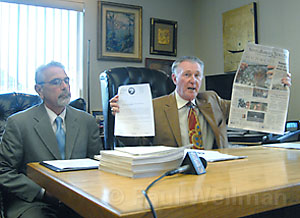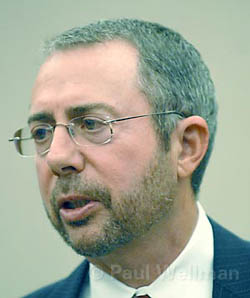All the News Not Fit to Print
RIP-n-READ: One of the more depressing aspects of the self-inflicted mutilation taking place at the News-Press is its withering effect on our ability to laugh. I hate to admit it, but it’s hard to crack wise when you have lawyers threatening to sue you to kingdom come. Greeting me on my computer Tuesday morning as I sat down to write the latest installment of this agonizing tale were not one, but two threatening letters from attorneys. One came from Barry Cappello, who represents News-Press owner Wendy McCaw. At least when Cappello bares his fangs, he likes to pretend he’s smiling. The same cannot be said for Martin Singer, the L.A.-based attorney representing McCaw’s private security consultant, Nick (“I Spy”) Montano. Both suggested in their own ways that even the questions I had been asking their clients were false and defamatory. Reporters aren’t surprised when governments try to intimidate the media into a quiescent somnolence; that’s what governments do. But when a newspaper owner threatens to sue anyone who looks at her sideways, well, that’s beyond bizarre. It’s downright scary.

My concerns pale in comparison to those of former News-Press editor Jerry Roberts, who, since he quit on July 6 over ethical differences with McCaw, has been engaged in a protracted legal and political battle with his former employer. Typically, Roberts exudes a self-deprecating cockiness that allows him to make light of such problems as losing his job, having his spleen removed, and his ongoing battle with cancer. He could even milk a few yuks about being sued by McCaw for $25 million.
But as of last Sunday, Roberts officially lost his sense of humor. Maybe it will show up on a milk carton someday soon. That’s because on Sunday, the News-Press published a front-page article linking Roberts to a kiddie porn investigation. “News-Press seeks exam of computer used by ex-editor Roberts containing child porn,” the headline read. The subhead underneath stated, “Roberts denies involvement.” While this gives the impression of being balanced, it has the ring of “When did you stop beating your wife?”

The article’s first paragraph explained how Santa Barbara police had gleaned no fewer than 15,000 pornographic images-of both adults and children-from the hard drive of a News-Press computer assigned to Roberts. What you don’t find out until later in the story is the computer was used by others as well. But even then, that critical point is made only tepidly. Nor does the story ever make clear that the computer was used by three editors who preceded Roberts. The whole reason city police have dropped the investigation is because the cops concluded it is technically impossible to determine who accessed those sick images and when. Part of the problem, according to the police, is none of the 15,000 porn files were accompanied by time signatures indicating when they were obtained. Given the machine had multiple users (high-ranking former editors), was not password-protected, and was frequently in areas where anyone could get at it, the cops decided there was no way to nail the guilty party.
The police also said it’s possible the images had been downloaded before the News-Press ever bought the machine, though Cappello disputes this. (In subsequent conversations, Cappello also suggested the forensic investigators bungled the job by using PC software on Roberts’s old Mac. This suggestion unofficially rankles the cops, who officially note the chief investigator is hardly some rube. In fact, they pointed out, he teaches high-tech forensics classes throughout the state for the Department of Justice.)
As a general rule, most people have strong feelings about child porn consumers, none of them printable in a family-oriented paper. And where certain crimes are concerned, the public is quick to presume guilt until innocence is proven beyond a reasonable doubt. Kiddie porn-which is against state and federal law to possess-is one such crime. Given these not-so-subliminal realities, one might have thought the News-Press would have assembled an iron-clad case before casting even the hint of suspicion on anyone remotely involved. And given the bad blood between Roberts and McCaw, one might have expected that paper to take special pains to prove the owner’s personal animus did not corrupt the daily paper’s news coverage. I’d like to think that was the case here, but if I said what I really thought, I’d spend what’s left of my career in depositions.
To give the article its due, it was a very cleverly executed piece. That’s why I was so shocked it had no byline identifying who wrote it. In the world of reporting-where I’ve lumbered the past 30 years-that’s a very telling sign. Naturally, I called Scott Steepleton, the News-Press associate editor, to find out why. I emailed him, too. I am still waiting for his reply.
For his part, Cappello wouldn’t comment on any aspect of how the article came to be. Smart man. The other unorthodox detail was how this unnamed writer never called Roberts for his statement. Cappello-violating his vow not to comment on such matters-suggested reporters were making a mountain out of a molehill. After all, the article included the fact that Roberts denied the charge, that he took a lie detector test and passed it with flying colors, and that some other employees of the News-Press may have used the computer before Roberts. Cappello went so far as to state the article in its totality was “very exculpatory,” lawyer-speak for presenting Roberts’s side of the story. Like I say, it was a clever piece of work.
For the record, Roberts has repeatedly denied downloading the offending material to the company’s computer and has vowed to sue for “massive damages” unless the News-Press prints an immediate front-page retraction. Smarter people than I have noted the article was based on documents filed by the News-Press on April 10 asking the court to order the Santa Barbara police department to return McCaw’s property. (The hard drives were given to the police after the Bay Area techno-geeks, hired by McCaw to conduct a brain-suck on the computer Roberts used, discovered the pornographic images.)
That’s important because reporters are protected from libel actions when they quote from court documents. Journalists have long known tricky operators will make outlandish allegations in court documents, hoping some unsuspecting cub reporter will come along and write it up. Certainly, there are those who suspect that was the case with Sunday’s article, only it was McCaw’s unnamed reporter writing about McCaw’s legal action. For the record, Cappello denied this. “You know my firm would not nor has it ever engaged itself in that manner,” he wrote. Then he warned against suggesting, implying, or innuendizing anything to the contrary. Just between you and me, I’d be afraid not to believe him.
The other clever detail about Sunday’s article was what was not included. Specifically, the names of the three other editors who had been given the computer in question before Roberts was even hired. I know their names, but I won’t list them. But then I wouldn’t have mentioned Roberts either, since no conclusive evidence has been presented to suggest he was implicated. The unnamed News-Press reporter, however, did not share such qualms. Roberts is convinced this proves the News-Press was out to smear him. I can’t say I agree with him because it might get me sued.
Roberts explained he’s also convinced the News-Press is improperly using its news pages to destroy his credibility because of what he says former News-Press computer guru Raul Gil told him. Naturally, Gil won’t speak to me for fear of becoming embroiled in litigation he can’t afford. Roberts claims, however, that when Gil was asked to sign a sworn statement about how the computer had been examined, Gil had to argue with News-Press security consultant Nick Montano to include the fact that other editors had used the same computer. Gil also said, according to Roberts, that Montano tried to talk him out of that claim.
When I phoned and emailed Montano for a response, I got a letter back from attorney Marty Singer, a famous legal pit bull to the stars, which denied that Gil ever told Montano any such thing until January 2007. He also disputed that Montano and Gil ever argued about it. To suggest otherwise, Singer wrote, would be false and defamatory. Ultimately Gil did include the information in his statement. He resigned almost immediately afterward, thus concluding a 23-year career that began when Gil started working for the News-Press as a 14-year-old paperboy.
The kiddie porn investigation is far from over, however. The FBI is on the case, though what’s being done, I don’t know. And maybe the News-Press will prevail in court next week and be given its disks back, thus allowing McCaw to pursue her own investigation. Maybe somebody will prove something definitive one way or another about how the porn got on the computer. But in the meantime, this has been a grim saga for Santa Barbara and an even grimmer one for journalism. And as much as I’d like to find something in all this to laugh about, I don’t really know how anymore. And it’s not just because I might get sued.



